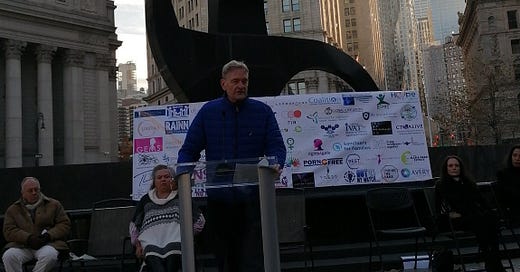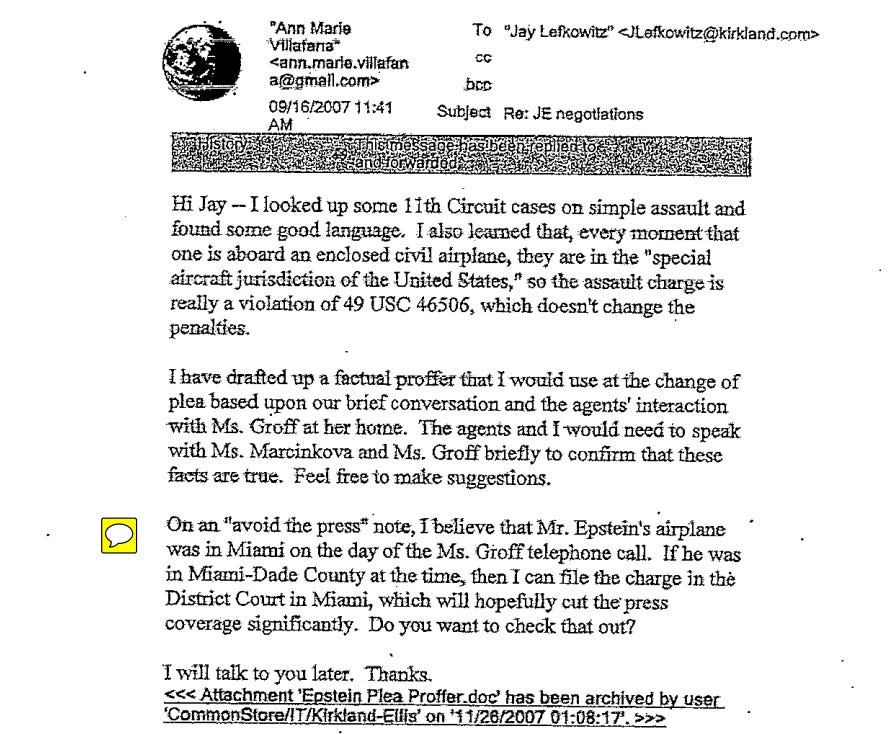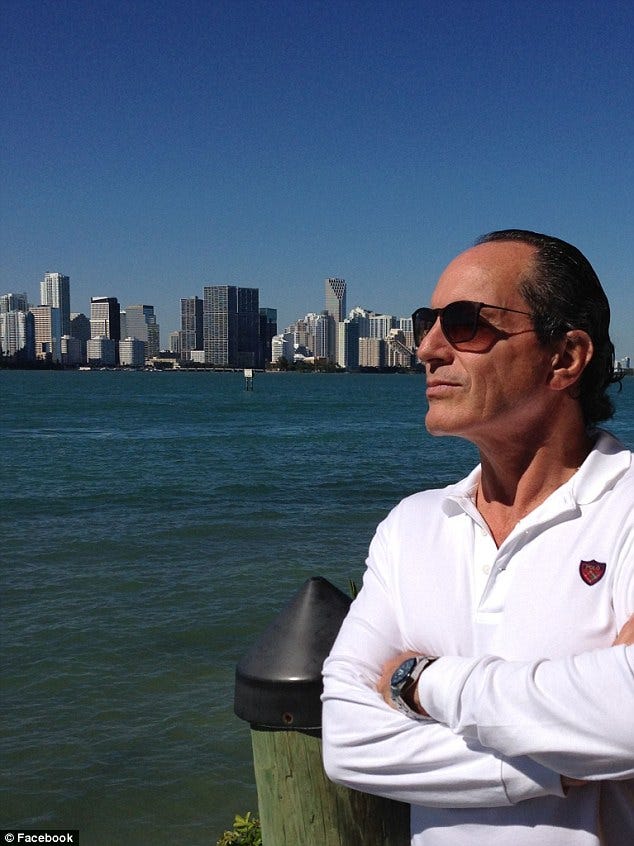Nick Bryant Talks Sarah Kellen, Black Book, Alex Acosta
From The Vault: January 7th, 2022 Interview with Nick Bryant
“It seems to me to be like a tacit agreement that the youngest Epstein victim was 14 years old…”
A year ago I did a very interesting interview with Nick Bryant, the journalist who first published Jeffrey Epstein’s little black book back in 2015. He’d attended a couple of days of the Ghislaine Maxwell trial, and we’d met in person at the rally for Epstein justice one weekend early on in the proceedings.
I never ended up getting around to posting this interview transcript, but most of it is still relevant. Bryant talked with me about his early days investigating the Epstein case before it was the huge story it is today, the provenance of the black book, his conversations with Epstein procurers like Sarah Kellen, and his insight into the media (who he struggled for years to try publishing about the case).
This interview has been edited lightly for clarity and length.
Do you remember when you first became aware of this whole Epstein case?
I became aware of Epstein in 2012. I saw that there was malfeasance going on in Florida, and I flew down to Florida to see what I could find. And I ultimately acquired Epstein’s black book, and I started calling victims whose numbers were in the black book, and one told me about being flown around, and about orgy island, and at that point I knew that Epstein was a trafficking network. And because there had been so much malfeasance to cover it up, I thought that it was probably like the Franklin Scandal, in the sense that it was connected to an intelligence operation.
I’d just been reading an interview with you before, you’d mentioned that again, you’d recognized it because of your work on the Franklin Scandal. What were the features—you mentioned government malfeasance—what were the other features that made you think it was the same sort of thing happening?
Well there was a couple of things; that grand jury that found that Epstein hadn’t abused a single child was the first red flag for me. And then after I’d talked to some Epstein victims and they talked about being flown around, then I knew at that point that it was most likely an intelligence operation because the amount of effort that was required to cover up Epstein and where the strings were pulled was pretty stunning. A US attorney was told to stand down with the Epstein case. There’s two people that can tell a US attorney to stand down: the Attorney General, and the president of the United States. Plus, the feds had a list of 32 victims. So I knew that someone very powerful was telling US attorney Alexander Acosta to stand down.
I was also reading your Scheer Post piece earlier, and you talked about Ann Marie Villafaña. I know that you talked to people in the Palm Beach Police Department at some point. Do you remember what they thought of her actions at the time?
Well, the Palm Beach Police Department, led by Michael Reiter, were completely appalled. They had found, and they had the statements of, five of Epstein’s victims, and they had the corroborating statements of 12 people. But the thing that was really shocking is that, with the grand jury anyway, the Palm Beach Police Department knew of 17 additional victims. So, when Ann Marie Villafaña took over as the chief prosecutor of that case and didn’t indict Epstein on a single count of child trafficking—and actually gave him that non-prosecution agreement that exonerated everyone that was involved with him—she was obviously taking orders from Alexander Acosta who was obviously taking orders from someone very high in the administration or the Justice Department.
And then, one of the things that I found really troubling was the emails between Ann Marie Villafaña and Epstein attorney Jay Lefkowitz. They basically set out how Epstein could be let off the hook, and how they were planning to do that. And so it was very premeditated on the side of the Department of Justice to let Epstein walk
Definitely. Yeah, I was looking through some of those emails before I talked to you and it’s pretty shocking how explicit it is.
Yeah.
They even talk about avoiding bad press and everything.
Avoiding bad press, getting the right magistrate to sign off on a really rotten corrupt deal—I mean, those emails are very telling.
Were you ever able to talk to anyone in the Justice Department about this?
I never interviewed Ann Marie Villafaña. I believe I sent her an email but this was very early on, and she never got back to me.
Were you ever able to talk to anyone on the Grand Jury or anyone that had any idea what happened with that Grand Jury? Or was it more that, you think that the case that was presented to them by the Justice Department was a bad case so they wouldn’t indict?
Well, that was actually a state Grand Jury that found Epstein guilty on one count of adult trafficking and the thing about Grand Juries is the proceedings are secret. The Grand juror’s names are secret, and also the proceedings are secret. So what happened there was [Palm Beach County State Attorney Barry] Krischer only called one victim. The Palm Beach Police Department knew of 23 victims at that point, and he only called one of them. And the reasons that they gave for discrediting those victims were really disingenuous. And I get into it in my Scheer Post article, about how corrupt that grand jury was. But so, but to have 23 victims and to only call one and then to do a slice and dice on that one victim really is an appalling sign of corruption.
So it was more the Justice Department that gave the Grand Jury nothing to indict on and then just ripped them to shreds than-
Well what happened there was, the Palm Beach Police Department was going to charge Epstein on five counts of child abuse. And I mean they were ready to go. And then that case was ripped from them and given to this Grand Jury that was run by State Attorney Krischer. That was really just a horrible thing because [they] didn’t indict Epstein on one count of child abuse and then at that point Michael Reiter, who was the Palm Beach police chief, became very vociferous about the corruption of that Grand Jury. And then ultimately the feds stepped in, and worked out a deal with the state where Epstein would be charged with one count of soliciting adult prostitution and then one count of child abuse. And he could have been sentenced to up to twenty years but he was sentenced to 18 months in a county jail and he served 13 months.
Right. So this is what you were doing when you flew down to Florida talking to all these police and figuring out the story of the grand jury, how did you—I know you don’t want to talk about the source and so I won’t press you obviously but, is there any sort of story of how the black book came to you that you can share?
I can, ok, so Alfredo Rodriguez was a house manager of Jeffrey Epstein. And he had pilfered Jeffrey Epstein’s Black Book and at that point a number of attorneys were launching civil lawsuits at Epstein. And, Alfredo Rodriguez wanted to sell the black book to one of those attorneys, and that attorney notified the FBI -
That was Brad Edwards, right.
And the FBI—one of them, yeah, one of the attorneys. And the FBI ultimately did a sting where Alfredo Rodriguez was busted, and he was given 18 months in prison, the same term that Epstein was given, which was pretty egregious. I think he was busted for withholding evidence, I think that was the count.
Oh yeah, I think I read that too, yeah. And then eventually it comes into your hands. Is that, were you mailed it, were you given it by somebody? I know obviously not who, but.
Yeah, was given it by someone that was affiliated with the case.
And at the time that you got it, there were the, you know he had circled some of the names. What made you think that those were the material witnesses. I know you’ve written about that?
Well, he has said that, according to the FBI, the names in the black book contained a number of material witnesses. And according to Rodriguez, the names that he circled were affiliated with Epstein. The darker side of Epstein’s enterprise.
Right. Do you, were there post-its in the book when you got it? Those post-it notes?
Uh, no.
How did those end up, were those your post-it notes?
No, they’re not mine.
Do you know how they ended up in that book, or no idea?
I do not know, no.
Ok, because I, you know I was at the courthouse and I saw the, there were all these post-it notes, and even in the scan that I think Gawker uploaded it looks like there’s post-it notes in it. So maybe it was them.
I don’t think so but, I mean that was six years ago but, I could be wrong. But I don’t remember Post-Its in the uh, there was, Alfredo Rodriguez’ circling of a number of names but I can’t remember that, I don’t think that there were Post-Its in the Black Book that I acquired.
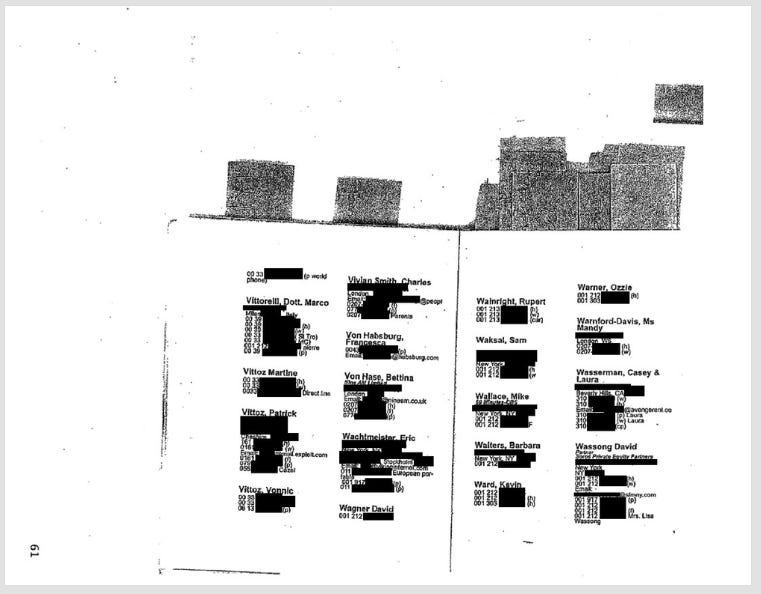
Gotcha. And just to confirm, you know, it is the same as Government Exhibit 52, the book that you were given.
Yes, yes.
And did you give it—I know they had a copy, but were you involved at all in giving it to the government for this case?
No, they already had it. They acquired it from Alfredo Rodriguez.
Right.
So, the FBI did. So, I didn’t need to give it to them.
Great, OK, and sort of circling back to, you know, now you say you’re writing a sort of third book about CIA blackmail rings [the since announced The Truth About Watergate, out in fall 2023]. Did you find any confirmation of intelligence links, like, explicit intelligence links. Did anyone go on the record, or off the record with you about that when you were looking into the Epstein case?
Alexander Acosta was the US attorney that was told to stand down.
Right.
And he eventually became Trump’s Labor Secretary. And when he was being interviewed for that position, he was asked why he went so light on Epstein. And Alexander Acosta said that he was told that Epstein was intelligence and that was above his pay grade. So, basically we have a U.S. attorney for the Southern District of Florida saying that he was told to stand down. And as I said earlier, there are two people that can tell, constitutionally anyway, a U.S Attorney to stand down, and that is the Attorney General, and also the President. And then, when we get into the blackmail, when the Palm Beach Police Department served a warrant on Epstein’s home in Florida, they found hidden cameras. Maria Farmer talked about hidden cameras in Jeffrey Epstein’s New York mansion. And then also there was an article in Vanity Fair about cameras on orgy island being spread out over orgy island. Now, what Maria Farmer said was really interesting. She said that Epstein led her to like this secret room and there were men, as in plural, monitoring the monitors. And the monitors had various bedrooms and the bathrooms under surveillance. If Maria Farmer is being truthful, and I do believe that she is, that shows that the Epstein blackmail operation was definitely a conspiracy, there were multiple people involved.
Yeah, I’ve talked with Maria, I believe what she says too. I wanted to get into some of like, the other figures you mention in your Scheer Post piece who maybe haven’t been written about as much. What was the deal with Haley Robson. What was her role in this?
She was a recruiter. She was initially a victim but then she became a recruiter.
And did you talk with her?
I didn’t talk with her, but the Palm Beach Police Department also thought that Haley Robson and Sarah Kellen should be indicted. And I didn’t talk to Haley Robson but I did talk to Sarah Kellen, and she felt that she was being persecuted and she felt that law enforcement’s actions and the media’s actions were completely inappropriate.
Did she feel like she had been a victim herself, was that the idea?
No, I just think that she had a martyr complex.
And you talked to her back in 2012, or recently?
I talked to her in 2012.
Yeah I wanted to ask about that, you said you called a bunch of the people in the book. Who did you talk to?
I talked to Kellen and I talked to some victims, and then I did leave some messages for people that weren’t returned, and then at that point I was trying to sell [a magazine story]. I had the black book, and I had the Palm Beach Police Department documentation. And this was in 2012 and I was trying to sell it and I could not sell it to a mainstream magazine.
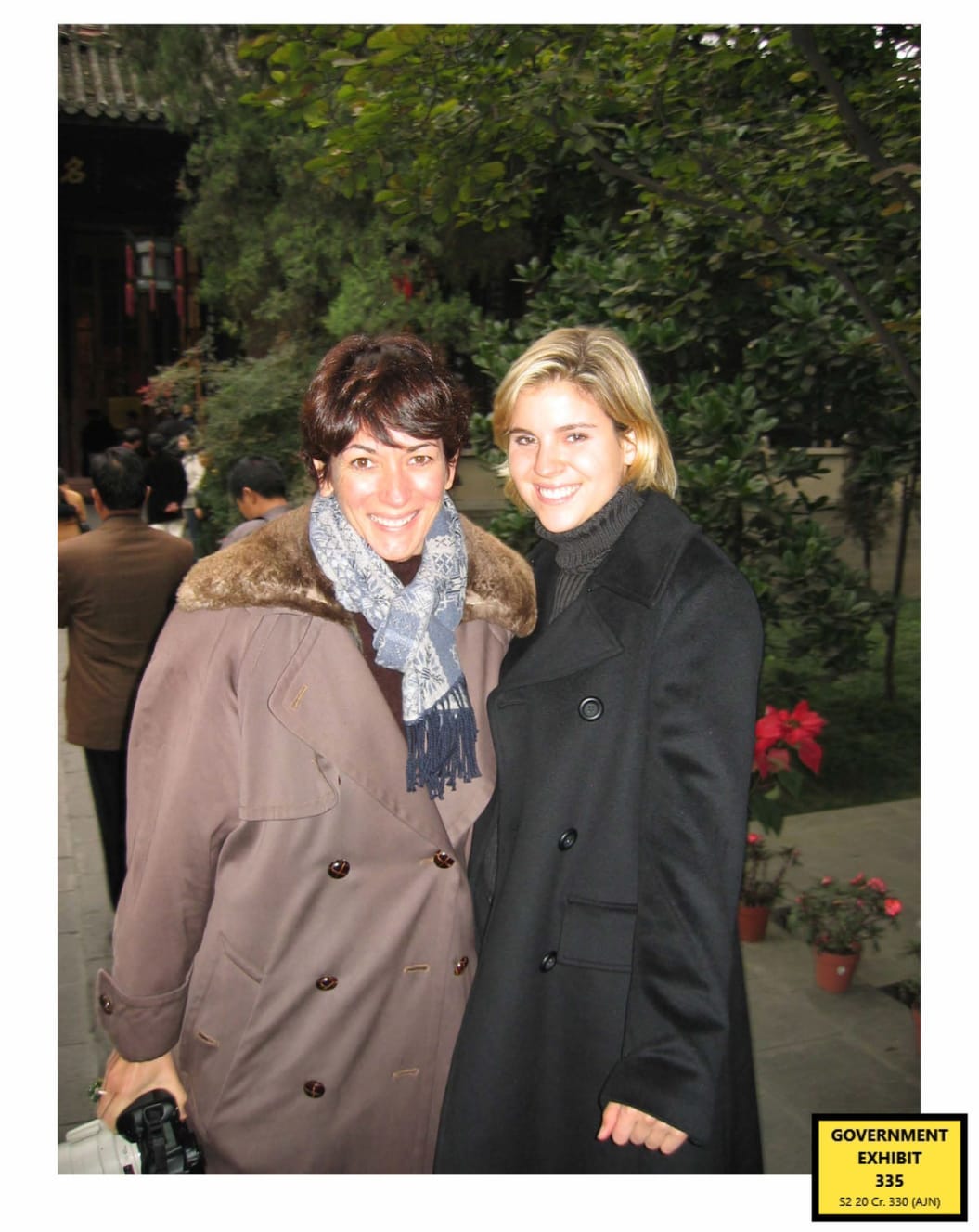
I’m interested in this too. Did any- were a lot of people just ignoring your pitches, or did they give any reasons why they weren’t responding?
The usual bullshit: this isn’t right for us. I’ve come to believe that people in the media—I’ve been pitching stories on child abuse, at least these power broker pedophile networks, for I would say about 18 years. And I’ve come to believe that the media as an aggregate really doesn’t care that much about children’s welfare. And it’s really, the reporting on Jeffrey Epstein has been pretty egregious. And Maxwell has been pretty egregious. The reporting has focused on salacious dirt. Whereas I, as far as I know, I am the only one to have written an article for a major magazine, or for a major website that actually calls for justice for Epstein’s victims.
Was there any media that might have been more receptive to you? How did that happen with Gawker? Did you just pitch them cold or did you, or did anybody help you?
No, I knew John Cook. I had shown John Cook the black book about a year earlier. And he had gone to The Intercept, and then he went back to Gawker. And then at that point he called me and then we worked out an arrangement where I would put up the black book and also a passenger manifest that I had.
That’s interesting. So The Intercept rejected Cook’s -
No, he had, well, he was at The Intercept—I don’t know if he pitched it there or not. But when he went back to Gawker he definitely gave me a call.
There’s this second black book that came out, I think Insider reported on it first, and they talked with you I think in was confirming it. What was the story there, what was your involvement?
No I didn’t confirm it at all.
Gotcha.
I was not contacted by anybody about the second black book.
What do you think about that book? Do you think it’s genuine or just have no idea?
It seems to be. I wouldn’t venture a guess either way though. I mean, I know that the black book that I had, I know the provenance of it, so, I definitely know that it is original. But John Cook and Insider must have agreed on the provenance of the book or else they wouldn’t have put it up.
Right. Did you ever talk with Alfredo Rodriguez, at any point?
No, he died of cancer awhile back, so I never had an opportunity to talk to him.
And was there anybody who was particularly helpful in the Palm Beach Police Department when you were down there in 2012, who might still be around?
No, no one really wanted to talk to me. Michael Reiter did talk to me for awhile and I had some questions about Epstein and he gave me some very useful information.
Reiter, is he still alive Reiter, was it Recarey who died recently?
He’s retired and he’s still alive.
Those are all my questions so, I know you’ve mentioned that justice is something that most of the media doesn’t mention. Is there anything else that the media just doesn’t seem to touch that you think people should know about the Epstein case?
Well, the amount of blackmail that went on. Although various news organizations have run articles about possible blackmail at this point there’s a lot of corroboration that Epstein and Maxwell were involved in blackmail. And, as far as I know, I’m the only journalist who put all those accounts together, and can look at them and show that Epstein was definitely a blackmail operation.
Did you ever find anything that might have indicated who might have been a target of his blackmail? I know there’s a lot of stuff that we’d assume, but, directly.
I think that there’s a lot of people in the black book that were targets of his blackmail. But here’s the, here’s the thing with that. I wrote about the, in The Franklin Scandal, which I talked about earlier, I wrote about a network that was very similar to Epstein’s. Epstein’s was around for about 25 years, this network was around for about 12 years. It was much bigger than Epstein’s network, but Epstein was around for longer so I think that that the same number of children were destroyed. I talked to one of the blackmail photographers for The Franklin Scandal, that was part of the Franklin Scandal. And I talked to him, and you know I asked him, well, how does all this work? And he said it’s like you’re on a yacht, and it’s a beautiful day. And you’re on this yacht and you can have anything you want on the yacht. But, if you decide to get off the yacht, or you start disagreeing with people on the yacht, they’re going to toss you overboard and make you drown. And I think that there are a lot of politicians that are probably compromised at this point. Our politicians have this potent alchemy of power, lust, and arrogance, which easily translates into extramarital affairs and aberrant behavior and even illicit deeds. So, I think that it would be relatively easy to black mail—I’ll give you an example, Larry Craig was a very conservative Senator from Idaho. And he was initially in Washington D.C. as a U.S. Representative and then he became a Senator. So he was in Washington D.C. for about 25 years. I co-authored a book called Confessions of a D.C. Madam about a CIA sexual blackmail operation. And Larry Craig was one of those clients, and then there was a film that came out by Kirby Dick called Outrage, which showed that Larry Craig was getting male prostitutes from elsewhere, and then Larry Craig was ultimately busted trying to pick up an undercover cop in a Minneapolis airport bathroom. So here’s a guy that’s been in Washington for 25 years, and he’s getting prostitutes from an escort service that is affiliated with the CIA, or the CIA is using to blackmail people, he’s getting prostitutes from elsewhere, and he’s even trying to pick up guys in bathrooms. So, I mean, how hard would it be to compromise that guy.
Right.
A kid doing an after school project with a smartphone could have compromised Larry Craig.
Good point. Well thank you Nick. I appreciate the time and answering the questions. I’m going to stop recording right now.
We talked for a couple of minutes, then Nick asked me to put him on the record to speak about something else.
Ok, you’re back on.
Another place where the media has really done a tremendous amount of damage is saying that the youngest, agreeing that the youngest, it seems to me to be like a tacit agreement that the youngest Epstein victim was 14 years old. And that’s just not the case. One of the victims…was 13, but there are [also] accounts of Epstein victims being younger than 10. And a number of those girls were pandered to very sadistic pedophiles, which the mainstream media have neglected to mention too.
Yeah, I know you’ve mentioned that and I haven’t seen it reported anywhere else. Where, where would I look to to learn more about that type of behavior? Because I’ve read your reports on that, but I’ve had trouble finding it anywhere else. Who would I talk to to learn more about something like that?
I’m sure that some of the victims know about it, and I also know an esteemed psychologist that has worked with a couple of Epstein victims who were abused before the age of ten. She did not tell me who, she did not tell me the girls’ names, but she did tell me that.
Very interesting. What’s her name?
I’m not gonna’ tell you that.
No worries, I had to ask. Ok, well great. Thanks again Nick, I really appreciate it.
This interview has been lightly edited for length and clarity.
Footnotes News is supported entirely by subscriptions and donations. If you get something out of the newsletter, consider subscribing or making a donation.
You can also contribute to the newsletter by buying the book I wrote on the French election Zemmour & Gaullism, available here, or subscribing to my Patreon.
